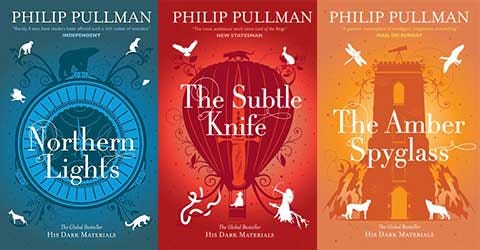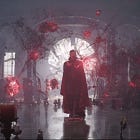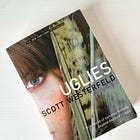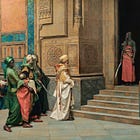This is the third essay in a series called Speculating on Fiction, in which we tackle big works of speculative fiction, thinking about their imagined worlds, their impact on characters and story, and what all of it is saying. Last week, we wrote about Uglies by Scott Westerfeld.
This essay contains only minor concept spoilers (no major character spoilers) which we hope will enhance your reading if you haven’t yet picked up the book.
Before I start: it turns out I had too much to say about this series, so if you’re reading this in your inbox, it may cut off part of the text — just click the link that says “read full email” at the bottom to get the full essay!
The first time I read Phillip Pullman’s His Dark Materials series, the first book wasn’t even called The Golden Compass; it was called Northern Lights (the British edition, I later learned), and I wasn’t even aware it was the first book in a series. But I was quickly enthralled by Lyra’s world.
His Dark Materials consists of three books: The Golden Compass, The Subtle Knife, and The Amber Spyglass. The Golden Compass follows Lyra, an orphaned girl in a parallel world, being brought up by scholars and theologians at their version of Oxford University. When her best friend, Roger, goes missing, she joins forces with an alluring and powerful woman, Mrs. Coulter, to try and rescue him.

The first time I read these books, the Biblical and religious elements went completely over my head — when I read the series again this year, I more easily recognized some of the allusions, but I am still unable to interpret them. I am not familiar with Christian mythology, nor have I read Paradise Lost.
In Phillip Pullman’s guide to writing, Daemon Voices: On Stories and Storytelling he explains that in writing His Dark Materials, he set out to write a 1,200 page version of Paradise Lost for children. But, as Simon Mason writes in his introduction to the book, “[Pullman] is interested, above all, in human nature, how we live and love and fight and betray and console one another. How we explain ourselves to ourselves.” And so I think there are still ways to derive meaning from these books, without explicit reference and dedication to its religious commentary.
As a child, I was obsessed with mysteries. I tore through Nancy Drew, Enid Blyton’s The Five Find-Outers, and Harriet the Spy — the last of which even inspired me to keep my own notebook filled with observations. And so, intrigued as I was by spy gadgets, I was drawn to the alethiometer.
The alethiometer, the titular item of The Golden Compass, is a clock-like device that provides answers to the asker’s questions. It is part of what makes Lyra special, because she is one of the only people to whom its interpretation comes naturally; scholars in her world spend years trying to discern the meanings behind its symbols. But the aletheiometer is just the beginning in her journey towards discovery.

In Lyra’s world, humans have daemons: animal representations of their souls that live outside their bodies. Lyra and her daemon, Pantalaimon, slowly learn about a substance known as Dust that is crucial to our existence. The idea of Dust is difficult to grasp — but eventually, it becomes clear that it represents some form of consciousness or energy. We know this because Dust surrounds adults and not children. This, and the fact that daemons can change form until they ‘settle’ when children undergo puberty and grow into adulthood, tells us that there is some fundamental difference between children and adults.
But Dust isn’t just interesting to the scientists and theologians. As Lyra discovers, the Magesterium, a representation of the Church, is trying to harness and manipulate Dust for their own gain. In the process, children are irreversibly harmed, and in some cases, killed. This is the first sign that knowledge, and, in particular, the unrelenting pursuit of knowledge, is not to be trusted.
Allegiances shift, and even through to the last book, it isn’t always clear which adults should be trusted, or what their true intentions are. We are, I think, meant to be confused about people in positions of power. We are meant to distrust them.
This idea is set up for us in the very first scene of The Golden Compass: Lyra sees the Master of the college, a man she trusts, and who has helped raise her, attempt to poison Lord Asriel. Lyra’s world is a world of deception, and we should not trust anyone in a position of authority.
But the books tell us something else about curiosity. In The Subtle Knife, we meet Mary Malone, a scientist in our world, who has devoted her life and career to studying something called shadows, or dark matter. Shadows are our version of Dust; the same concept by a different name.
As she continues in her pursuit of knowledge, she meets creatures known as the Mulefa, who, in turn, have their own name for Dust: sraf. She spends the majority of the third book, The Amber Spyglass, living with the Mulefa, and attempting to understand them. She learns their language, familiarizes herself with their customs, and helps them when their species is in danger. Her curiosity, and willingness to learn, is ultimately what leads her to harnessing the Amber Spyglass in order to discover the truth.
How can we trust Dr. Malone’s curiosity? And how do we know what the real truth is?

At one point in The Amber Spyglass, Lyra and her friend Will find themselves in the underworld, where all of a sudden, they are besieged by harpies, who torment them, and attempt to block them from re-entering the world of the living. When Lyra attempts to spin a story based on lies, something she has been doing for the past three books (and which we should be paying close attention to given her name’s close relation to the word ‘lie’), the harpies attack her. They are not fooled by lies.
Lyra and Will make a deal with the harpies: the ghosts in the world of the dead will tell the harpies stories about their lives — those who tell true stories, and share what it meant to be alive, will be escorted by the harpies to the world of the living. Those who lie, or who have no true story to tell, will languish forever in the world of the dead.
The truth that lies behind Dust, shadows, and the mysteries of His Dark Materials is not a universal truth, then. It is a specific, individual truth. Each person finds their own truth, not only by devoting time and energy to curiosity and discovery, but by growing up, maturing, and allowing that curiosity to shape their growth.
“Innocent is not wise; wisdom cannot be innocent,” writes Pullman in Daemon Voices, “And it is very painful and it’s very hard, but it’s the only way forward, and in the end, if we keep on trying, we shall have acquired a deeper, fuller, richer understanding than we ever had before we tasted the fruit of knowledge of good and evil.”
At the beginning of the series, Lyra has a natural ability to read the alethiometer. One of the first times she uses it, she asks about the gyptians, a group of people who are working as spies at the time of her reading. When she does this, she knows to use the symbols of serpent, crucible, and beehive to mean cunning, knowledge, and hard work. The alethiometer gives her the hourglass as an answer, which she realizes means death.
But by the end of The Amber Spyglass, Lyra has lost this ability. She looks at the alethiometer, and realizes she can no longer manipulate it the way she used to.
“Why — ” Lyra began, and found her voice weak and trembling —“why can’t I read the alethiometer anymore? Why can’t I even do that? That was the one thing I could do really well, and it’s just not there anymore — it just vanished as if it had never come…”
“You read it by grace,” said Xaphania, looking at her, “and you can regain it by work.”
“How long will that take?”
“A lifetime.”
Lyra has grown up, and she has lost the trust, curiosity, and desire for discovery that she once had. But that doesn’t mean it’s gone forever — with careful work, and lifelong dedication, those qualities can be regained. At least, that’s how I choose to interpret it. How else can we ensure that our pursuit of knowledge is pure, that it is not abused, and that we stay curious?
But then, these are all my musings. Others may disagree, or find my reading to be completely missing the point. But there is value in these explorations.
At one point in The Amber Spyglass, Will is talking to Balthamos, an angel, asking question after question about death, angels, and multiple worlds.
“How do people become angels?” Will asks.
Balthamos, tired of the questions, retorts: “What is the point of this metaphysical speculation?”
What is the point, indeed?
— Shruti
Speculating on Fiction
This essay was part of our summer series titled Speculating on Fiction. Find previous installments below:
Related Posts
If you loved reading about His Dark Materials, here are some other essays from our archive that you might enjoy:








